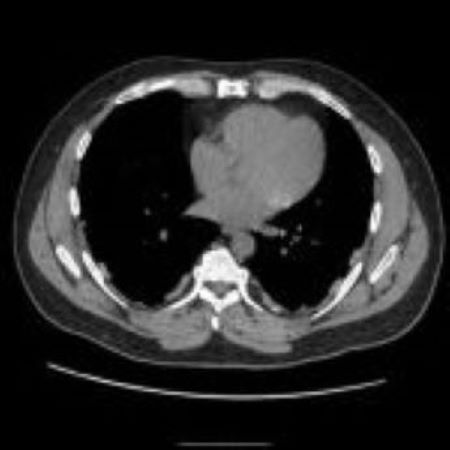Pneumoconiosis diagnostic criteria
|
Pneumoconiosis Microchapters |
|
Diagnosis |
|---|
|
Treatment |
|
Case Studies |
|
Pneumoconiosis diagnostic criteria On the Web |
|
American Roentgen Ray Society Images of Pneumoconiosis diagnostic criteria |
|
Risk calculators and risk factors for Pneumoconiosis diagnostic criteria |
Editor-In-Chief: C. Michael Gibson, M.S., M.D. [1]; Associate Editor(s)-in-Chief: Dushka Riaz, MD
Overview
Diagnostic Study of Choice
Study of choice

1. Radiologic tests must be performed to test for asbestosis when:
- The patient has had exposure to asbestos (with Helsinki criteria indicating the dose being at least 25 fibre/ml.years.
- The CT scan would show pulmonary fibrosis, pleural thickening and pleural plaques. [1] [2]
2. The best test for Silicosis is a high resolution CT:
- It would show widespread fibrosis with bilateral nodules and evidence of involvement of lymph nodes. It can be confirmed with lung biopsy showing acellular whorls, bi-refringent crystals of silica. [3]
Investigations:
- Among the patients who present with clinical signs of [disease name], the [investigation name] is the most specific test for the diagnosis.
- Among the patients who present with clinical signs of [disease name], the [investigation name] is the most sensitive test for diagnosis.
- Among the patients who present with clinical signs of [disease name], the [investigation name] is the most efficient test for diagnosis.
Sequence of Diagnostic Studies
The various investigations must be performed in the following order:
- [Initial investigation]
- [2nd investigation]
Diagnostic Criteria
To be qualified as a pneumoconiosis or occupational disease there must be four criteria met:
- This includes documented exposure to the particle.
- Latent period before the development of symptoms.
- Clinical signs and symptoms that entail the disease
- Exclusion of other disease modalities. [4]
References
- ↑ Darnton A, Hodgson J, Benson P, Coggon D (2012). "Mortality from asbestosis and mesothelioma in Britain by birth cohort". Occup Med (Lond). 62 (7): 549–52. doi:10.1093/occmed/kqs119. PMC 3471357. PMID 23034792.
- ↑ "Asbestos, asbestosis, and cancer: the Helsinki criteria for diagnosis and attribution". Scand J Work Environ Health. 23 (4): 311–6. 1997. PMID 9322824.
- ↑ Cullinan P, Reid P (2013). "Pneumoconiosis". Prim Care Respir J. 22 (2): 249–52. doi:10.4104/pcrj.2013.00055. PMC 6442808. PMID 23708110.
- ↑ Epler GR (1992). "Clinical overview of occupational lung disease". Radiol Clin North Am. 30 (6): 1121–33. PMID 1410303.